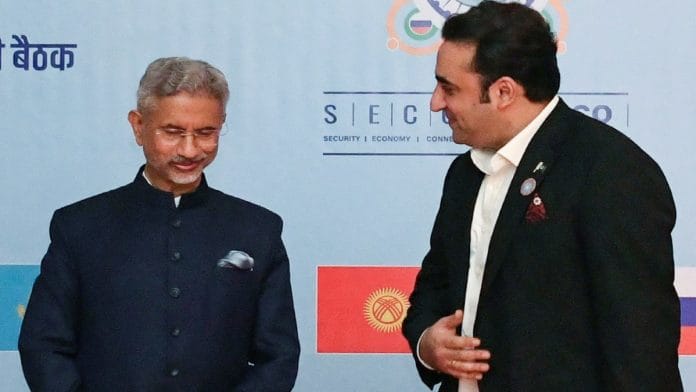Benaulim, Goa: In his address at the Shanghai Cooperation Organisation’s (SCO) Council of Foreign Ministers meeting in Goa Friday, Pakistan Foreign Minister Bilawal Bhutto Zardari spoke against the ‘weaponisation’ of terrorism for scoring diplomatic points and batted for the China-Pakistan Economic Corridor (CPEC) to enhance regional connectivity.
“Terrorism continues to threaten global security. Let’s not get caught up in weaponising terrorism or trying to earn diplomatic points for it,” said the Pakistan foreign minister, adding that the menace of terrorism requires a collective approach by all SCO member states.
“Terrorist groups within Pakistan are cooperating among themselves more than we are as the international community,” he remarked.
Zardari’s comments come a week after Indian External Affairs Minister Jaishankar — during a press briefing in Panama — said that it is “very difficult” for India to engage with a neighbour that practices cross-border terrorism.
Days prior to Jaishankar’s statement, five Indian soldiers were killed in a terrorist attack in Jammu and Kashmir’s Poonch district.
In his address, Zardari also called for Regional Anti-Terrorist Structure (RATS), a permanent organ of the SCO, to be strengthened.
Bilawal-Zardari’s visit is the first by a high-level Pakistani official to India in nearly a decade. The last such visit was in May 2014, when then Pakistani prime minister Nawaz Sharif attended Prime Minister Narendra Modi’s oath-taking ceremony in New Delhi.
Also Read: Jaishankar calls on SCO foreign ministers to support ‘New Delhi declaration’ & 4 joint statements
‘CPEC can be force multiplier for regional connectivity’
During his address at the SCO Council of Foreign Ministers meeting, the Pakistani foreign minister talked about the need to elevate Eurasian connectivity and said the CPEC can be used to materalise this vision.
“We see the SCO as a key platform to take the Eurasian connectivity to the next level,” he said, adding that SCO member states must build on last year’s Samarkand Declaration that called for building efficient transport corridors and reliable supply chains.
“The CPEC can similarly be a force multiplier for regional connectivity,” he added.
Pakistan will be hosting the “Conference on Transport Connectivity for Regional Prosperity” later in September.
Zardari also used his address at the CFM to praise China’s efforts to broker a deal between Iran and Saudi Arabia to restore ties.
“With great powers playing the role of peacemaker, we can unlock the potential of peace while paving the way for greater cooperation, regional integration and economic opportunities,” he said.
‘Situation in Afghanistan poses new complications to global security’
Commenting on the security threats emanating from Afghanistan since the Taliban takeover, Zardari said the situation has added “new complications” to global security and called on the international community to “meaningfully engage with the Afghan interim government”.
“A united international community can compel the authorities to demonstrate their will and help build their counter-terrorism capacity for the security of Afghanistan, the region and the world at large,” he added.
In the run-up to his visit to India, the Pakistan foreign minister had received much criticism from opposition parties in his country.
For example, weeks ago, Pakistan Tehreek-e-Insaf (PTI) Vice President Fawad Chaudhry — who belongs to the same party as ousted Pakistan PM Imran Khan — tweeted that Bhutto’s visit was “a stab in the back of the struggle of Kashmiris”.
In what appeared to be an attempt to quiet domestic criticism, Bhutto began his remarks at the CFM in Goa by arguing that his presence at the meeting was a show of Pakistan’s commitment to the SCO, especially as a vehicle for “economic connectivity”.
“There couldn’t be a more powerful indication of the importance that Pakistan attaches to the SCO than my presence here in Goa,” he said.
“[SCO] principles are in perfect alignment with Pakistan’s own vision of enhanced regional economic connectivity,” he added.
Currently, Pakistan is facing mounting economic troubles and recently surpassed Sri Lanka as the country with the highest inflation rate in South Asia.
(Edited by Zinnia Ray Chaudhuri)
Also Read: SCO foreign ministers’ meet in Goa: What to expect & what 1-yr presidency means for India






